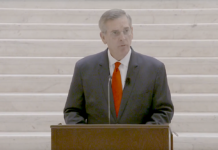
WASHINGTON (GA Recorder) — U.S. House Republicans were unable for a third time Thursday to begin debate on the Defense funding bill, throwing another wrench into Speaker Kevin McCarthy’s leadership tenure.
The 212-216 vote that rejected the rule for the $826 billion Defense spending measure was unexpected, coming less than a day after House GOP lawmakers gathered in a room in the Capitol basement to broker a path forward.
Arizona Rep. Eli Crane and Rep. Marjorie Taylor Greene of Rome, Georgia, switched their votes to oppose the rule after voting on Tuesday to adopt it. Colorado Rep. Ken Buck and South Carolina Rep. Ralph Norman both supported adoption of the rule on Thursday after opposing it earlier in the week.
Other Republicans voting no included Andy Biggs of Arizona, Dan Bishop of North Carolina, and Matt Rosendale of Montana. The rule would have allowed the House to begin officially debating the bill and voting on nearly 200 amendments.
RELATED: What to expect if the government shuts down
The failed vote led McCarthy to reverse course on the schedule, with many lawmakers heading home for the weekend on Thursday instead of sticking around for votes throughout the weekend. McCarthy had said exactly one week ago “When we come back, we’re not going to leave. We’re going to get this done.”
The update to the House schedule sent around Thursday afternoon said, ”ample notice will be given ahead of any potential votes tomorrow or this weekend.”
The stalemate and change of plans do not bode well for efforts to approve the short-term spending bill that’s needed to stave off a partial government shutdown when the new fiscal year begins Oct. 1.
McCarthy has yet to unify his members amid deep disagreements about how much the federal government should spend and what policy restrictions should be included in full-year bills as well as the stopgap measure.
The ongoing dispute has ground the House chamber to a halt as McCarthy searches for a way to unify his razor-thin majority without turning to Democrats to pass a bipartisan bill.
Arkansas Republican Rep. Steve Womack, a senior appropriator, said Thursday that his fellow lawmakers need to accept the Senate will re-work any partisan bills the House sends over.
“Remember, this is all going to go to the Senate, so people don’t need to get real hot and bothered over where we are today,” Womack said. “It’s going to be based on what comes back and whether or not it can get to the floor.”
Discussions among House Republicans, he said, are likely to become “heated” once the Senate re-works a short-term spending bill and sends it back to the House for a final approval vote.
Infighting and political differences within the House Republican Conference have so far prevented GOP lawmakers from reaching agreement on their opening offer on a short-term spending bill, which is also called a continuing resolution or CR.
Defense spending bill falters
Before the Thursday vote, McCarthy had been somewhat optimistic the House could finally approve the rule and begin debate on the full-year Defense spending measure.
Greene wrote on X that she switched her vote “because they refused to take the war money for Ukraine out and put it in a separate bill.” The rule approved 184 amendments for floor debate and votes, including one from Florida’s Matt Gaetz that would have prohibited “security assistance for Ukraine.”
Crane wrote on X on Thursday that he believes votes “on CRs, omnibus bills and raising the debt ceiling should never take place.”
“I’m going to do whatever I can to change the way this place works,” he wrote.
Oklahoma Republican Rep. Tom Cole, chair of the Rules Committee, switched his vote on Thursday to a no vote after voting yes a few minutes earlier. The procedural maneuver allows him to bring the rule back up for a vote at a later time.
The whip count error appeared to be a surprise for Defense Appropriations Chair Ken Calvert, a California Republican; ranking member Betty McCollum, a Minnesota Democrat; and staff — all of whom were seated at the tables on the House floor ready to lead debate on the measure.
The Republican table held thick white binders as well as a large accordion folder, all filled with paperwork and the Democratic table was stacked with paperwork as well. It’s highly unlikely that staff would have brought all the materials needed to debate the bill and amendments if they knew the rule vote was going to fail.
‘At least a short-term shutdown’
In addition to strong disagreement among House Republicans about the full-year spending bills, the House GOP Conference has yet to solidify a plan to pass the short-term stopgap spending bill that’s needed to hold off a funding lapse.
Idaho Republican Rep. Mike Simpson, chair of the Interior-Environment spending subcommittee, said he expects there will be “at least a short-term shutdown” as the House and Senate try to reach agreement on a short-term spending bill.
“That’s a lot of work to do in a very short time,” Simpson said.
House Freedom Caucus Chair Scott Perry, a Pennsylvania Republican, said Thursday that he hasn’t seen details on any new short-term spending bills that might come to the floor.
“I haven’t seen the language of any additional CR,” he said.
Kansas Sen. Jerry Moran, the top Republican on the Commerce-Justice-Science spending panel, said he’s “hoping the House chaos is set aside.”
“I keep saying I’m not voting for another CR again, but I keep voting for them because the outcome is worse with a shutdown,” Moran said. “But this just needs to be resolved in the House. I don’t think there’s a problem in the Senate that would cause a shutdown.”
Any short-term spending bill will have to be bipartisan in order to get through the Democratically controlled Senate where at least 60 votes are needed to limit debate on legislation. That could take more time than lawmakers have before Oct. 1, he said.
“Nothing about this is conducive to getting something done quickly and we’ve got to start with something that’s acceptable,” Moran said.
‘We’re in kind of a desperate situation’
Senate Majority Whip Dick Durbin, an Illinois Democrat, said he’s unsure when the Senate would take up a short-term government funding bill since House Republicans haven’t announced what they’ll vote on or when they’ll vote to pass a CR.
“The House is a wreck and the speaker doesn’t appear to have a path using his majority to solve a serious national problem, so we’re in kind of a desperate situation,” Durbin said.
The House Appropriations Committee has approved 10 of its 12 spending bills for the fiscal year slated to begin Oct. 1, but the House has approved just one of those so far. All of the bills are partisan and written below the spending levels that McCarthy and President Joe Biden agreed to in the debt limit law.
The Senate spending panel has approved all dozen of its annual bills on broadly bipartisan votes, though efforts to pass a three-bill spending package halted last week after Wisconsin Republican Sen. Ron Johnson objected to leaders scheduling amendment votes.
The biggest hurdle for Congress at the moment is gaining support for the continuing resolution that would extend government funding past the end of the fiscal year on Sept. 30. That short-term spending bill is regularly relied on to give the House and Senate more time to negotiate final versions of the dozen annual spending bills.
Failing to approve a short-term spending bill before the start of fiscal 2024 on Oct. 1. would begin a funding lapse, leading wide swaths of the federal government to shut down.







